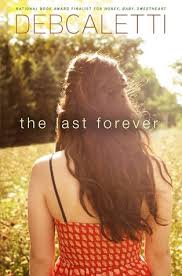Caletti, Deb. The Last Forever. New York: Simon Pulse, 2014. 978-0-605-80385-5. 321p. Gr. 8+.
After struggling to deal with her mother’s death, Tess and her dad take off on a road trip from San Bernardino to the Grand Canyon, but soon end up in Oregon, on Parrish Island, her dad’s hometown. Not remembering Parrish Island or her grandmother, Jenny, Tess isn’t sure why her father has returned to a home he hasn’t visited for as long as she can remember. To make matters worse, Tess’s dad leaves her with Jenny, a woman she has no knowledge of, without letting her know when he’ll return. As Tess tries to get to know Jenny and Parrish Island, her world begins to break apart again as the only remaining item of her mother’s, the rare Pixiebell plant that her Grandfather Leopold stole decades ago, begins to die. Tess cannot handle another loss, especially this one, so she must find a cure for the dying plant and fast. It is at the library that Tess meets Sasha, the librarian, and gets to know Henry Lark, the boy who will turn her world upside-down as they try to save the Pixiebell. As the plant continues to die, despite all of their efforts, the relationships between the friends, Tess and Henry, Tess and Jenny, and Tess and her father are strained. Can they save the Pixiebell and themselves, or will Tess have to live with the loss of her mother all over again? Deb Caletti returns to the Pacific Northwest in her newest novel. Using the small town of Parrish Island, she is able to capture the importance of family, friendship, and community, while exploring natural growth, maturation, and death, both literally and figuratively.
Realistic Fiction Erin Parkinson, Lincoln JSHS, Ellwood City
I am not a fan of romance novels, so I usually steer clear of certain YA authors, but after reading many starred reviews (Booklist, Horn Book, Kirkus, and Publisher’s Weekly) I had to pick up Deb Caletti’s newest novel. At first I really enjoyed the dynamic between Tess and her father as they mourned the loss of her mother, but then things got weird for me. I liked the idea of Parrish Island and reconnecting with Jenny to help guide Tess and her father “home” and the idea of family and community to help one mourn. What I didn’t like was Svalbard and the entire storyline surrounding it. I was fine with Tess trying to save the Pixiebell; that made complete sense. It was the idea of Svalbard that I couldn’t accept. It seemed too outrageous for an average person to even dream of, and then when things started happening (I won’t give away the ending), I was done. I think the novel would have been awesome without this part; truly I think it would have been more impactful to focus on grief and family relationships. Students understand these emotions and situations and need to be comforted when dealing with loss, family struggles, and new people and places. One thing I did love with this novel was the emphasis on the library and the relationships that Tess had with others and her family because of it. My favorite quote from the novel establishes the importance of libraries, not only to communities, literature, and learning, but also to growth and maturity. “I’m in shock […] I let it all – pounding rain against the windows, the quiet, the soft chair – take me in and give me comfort. I’m surrounded by stories and answers and years and years of volumes of the right words. My heart, which has been beating fast, starts to slow. That great musty smell of the library speaks of solid, timeless things, old and lasting ones, and I know what I have to do, of course […] Sometimes you don’t want to go on, but you have to. You absolutely have to, because there are things waiting for you” (Caletti 59-60). Finally, one more quote, specifically for the librarians, “Librarians know just about everything, but they especially know how to mind their own business” (Caletti 60).

